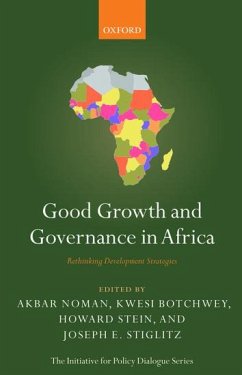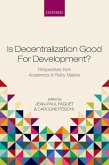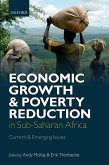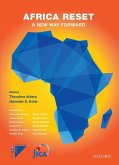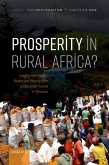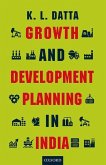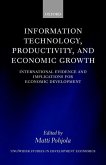Akbar Noman, Kwesi Botchwey, Howard Stein
Good Growth and Governance in Africa
Rethinking Development Strategies
Akbar Noman, Kwesi Botchwey, Howard Stein
Good Growth and Governance in Africa
Rethinking Development Strategies
- Gebundenes Buch
- Merkliste
- Auf die Merkliste
- Bewerten Bewerten
- Teilen
- Produkt teilen
- Produkterinnerung
- Produkterinnerung
This volume examines the history of developmental policy in Sub-Saharan Africa and considers how different policy options might generate sustained economic growth and reduce poverty. It documents and interprets policy lessons and considers how to translate them to particular country contexts.
Andere Kunden interessierten sich auch für
![Is Decentralization Good for Development? Is Decentralization Good for Development?]() Is Decentralization Good for Development?181,99 €
Is Decentralization Good for Development?181,99 €![Economic Growth and Poverty Reduction in Sub-Saharan Africa Economic Growth and Poverty Reduction in Sub-Saharan Africa]() Economic Growth and Poverty Reduction in Sub-Saharan Africa156,99 €
Economic Growth and Poverty Reduction in Sub-Saharan Africa156,99 €![Financing Water Security and Green Growth Financing Water Security and Green Growth]() Robert C BrearsFinancing Water Security and Green Growth108,99 €
Robert C BrearsFinancing Water Security and Green Growth108,99 €![Africa Reset Africa Reset]() Africa Reset153,99 €
Africa Reset153,99 €![Prosperity in Rural Africa? Prosperity in Rural Africa?]() Prosperity in Rural Africa?162,99 €
Prosperity in Rural Africa?162,99 €![Growth and Development Planning in India Growth and Development Planning in India]() K L DattaGrowth and Development Planning in India88,99 €
K L DattaGrowth and Development Planning in India88,99 €![Information Technology, Productivity, and Economic Growth Information Technology, Productivity, and Economic Growth]() Matti Pohjola (ed.)Information Technology, Productivity, and Economic Growth217,99 €
Matti Pohjola (ed.)Information Technology, Productivity, and Economic Growth217,99 €-
-
-
This volume examines the history of developmental policy in Sub-Saharan Africa and considers how different policy options might generate sustained economic growth and reduce poverty. It documents and interprets policy lessons and considers how to translate them to particular country contexts.
Hinweis: Dieser Artikel kann nur an eine deutsche Lieferadresse ausgeliefert werden.
Hinweis: Dieser Artikel kann nur an eine deutsche Lieferadresse ausgeliefert werden.
Produktdetails
- Produktdetails
- Verlag: Hurst & Co.
- Seitenzahl: 610
- Erscheinungstermin: 2. März 2012
- Englisch
- Abmessung: 234mm x 155mm x 41mm
- Gewicht: 1021g
- ISBN-13: 9780199698561
- ISBN-10: 0199698562
- Artikelnr.: 34226292
- Herstellerkennzeichnung
- Libri GmbH
- Europaallee 1
- 36244 Bad Hersfeld
- 06621 890
- Verlag: Hurst & Co.
- Seitenzahl: 610
- Erscheinungstermin: 2. März 2012
- Englisch
- Abmessung: 234mm x 155mm x 41mm
- Gewicht: 1021g
- ISBN-13: 9780199698561
- ISBN-10: 0199698562
- Artikelnr.: 34226292
- Herstellerkennzeichnung
- Libri GmbH
- Europaallee 1
- 36244 Bad Hersfeld
- 06621 890
Akbar Noman is an economist with wide-ranging experience of policy analysis and formulation in a variety of developing and transition economies, having worked extensively for the World Bank where he was Senior Economist for Ethiopia and an influential adviser to the government. He combines teaching at SIPA with being a Senior Fellow at the Initiative for Policy Dialogue. His other academic appointments have been at Oxford University (where he was also a student) and the Institute of Development Studies at the University of Sussex. Kwesi Botchwey was Ghana's Ministers of Finance from 1983-1995 and he was key to stabilizing the country's collapsed economy. He is a member of the President's Economic Advisory Council (Ghana) and member of the UN Committee on Development Policy (CDP). His past positions include: Professor of Practice in Development Economics at the Fletcher School, Tufts University and Director of African Research and Programs at the Center for International Development at Harvard University. Howard Stein also teaches in the Department of Epidemiology. He is a development economist educated in Canada, the US, and the UK who has taught in both Asia and Africa. His research has focused on foreign aid, finance and development, structural adjustment, health and development, rural property right transformation, and industrial policy. His most recent monograph is Beyond the World Bank Agenda: An Institutional Approach to Development (University of Chicago Press, 2008). Joseph E. Stiglitz is the winner of the 2001 Nobel Memorial Prize in Economics, and a lead author of the 1995 report of the IPCC, which shared the 2007 Nobel Peace Prize. He was chairman of the U.S. Council of Economic Advisors under President Clinton and chief economist and senior vice president of the World Bank for 1997-2000. Prior to Columbia he held the Drummond Professorship at All Souls College, Oxford, and professorships at Yale, Stanford, and Princeton. He is the author of the best-selling Globalization and Its Discontents, Making Globalization Work, Fair Trade For All, and most recently of Freefall: America, Free Markets, and the Sinking of the Global Economy. His engagement with Africa began more than 40 years ago, at the Institute of Development Studies in Nairobi.
* Part I: Introduction and Overview
* 1: Akbar Noman and Joseph Stiglitz: Strategies for African
Development
* Part II: Governance, Institutions and the State
* 2: Mushtaq Khan: Governance and Growth: History, Ideology and Methods
of Proof
* 3: Thandinka Mkandawire: Institutional Monocroping and Monotasking in
Africa
* 4: Mushtaq Khan: Governance and Growth Challenges for Africa
* 5: Meles Zenaewi: States and Markets: Neoliberal Limitations and the
Case for a Developmental State
* 6: Augustin Fosu: The African Economic Growth Record, and the Roles
of Policy Syndromes and Governance
* Part III: Technology, Industrial and Trade Policies
* 7: Izumi Ohno and Kenichi Ohno: Dynamic Capacity Development: What
Africa Can Learn from Industrial Policy Formulation in East Asia
* 8: Robert Wade: How can Low-Income Countries Accelerate their
Catch-up with High-Income Countries? The Case for Open-Economy
Industrial Policy
* 9: Banji B. Oyeyinka and Padmashree Gehl Sampath: Institutional
Capacity and Policy Choices for Latecomer Technology Development
* 10: Kunal Sen and Dirk Willem te Velde: State-Business Relations,
Investment Climate Reform and Economic Growth in Sub-Saharan Africa
* 11: Howard Stein: Africa, Industrial Policy and Export Processing
Zones: Lessons from Asia
* 12: Nimrod Zalk: South African Post-Apartheid Policies Towards
Industrialization: Tentative Implications for Other African Countries
* 13: Matsuo Watanabe and Atsushi Hanatani: Issues in Africa's
Industrial Policy Process
* 14: David Bailey, Helena Lenihan and Ajit Singh: Tiger, Tiger Burning
Bright? Industrial Policy Lessons from Ireland for Small African
Economies
* Part IV: Employment and Human Capital
* 15: Aziz Khan: Employment in Sub-Saharan Africa: Lessons to be Learnt
from the East Asian Experience
* 16: Yaw Ansu and Jee-Peng Tan: Skills Development for Economic Growth
in Sub-Saharan Africa: A Pragmatic Perspective
* Part V: International Context
* 17: Jomo K.S. and Rudiger von Arnim: Economic Liberalization and
Constraints to Development in Sub-Saharan Africa
* 18: Deepak Nayyar: The Emerging Asian Giants and Economic Development
in Africa
* 1: Akbar Noman and Joseph Stiglitz: Strategies for African
Development
* Part II: Governance, Institutions and the State
* 2: Mushtaq Khan: Governance and Growth: History, Ideology and Methods
of Proof
* 3: Thandinka Mkandawire: Institutional Monocroping and Monotasking in
Africa
* 4: Mushtaq Khan: Governance and Growth Challenges for Africa
* 5: Meles Zenaewi: States and Markets: Neoliberal Limitations and the
Case for a Developmental State
* 6: Augustin Fosu: The African Economic Growth Record, and the Roles
of Policy Syndromes and Governance
* Part III: Technology, Industrial and Trade Policies
* 7: Izumi Ohno and Kenichi Ohno: Dynamic Capacity Development: What
Africa Can Learn from Industrial Policy Formulation in East Asia
* 8: Robert Wade: How can Low-Income Countries Accelerate their
Catch-up with High-Income Countries? The Case for Open-Economy
Industrial Policy
* 9: Banji B. Oyeyinka and Padmashree Gehl Sampath: Institutional
Capacity and Policy Choices for Latecomer Technology Development
* 10: Kunal Sen and Dirk Willem te Velde: State-Business Relations,
Investment Climate Reform and Economic Growth in Sub-Saharan Africa
* 11: Howard Stein: Africa, Industrial Policy and Export Processing
Zones: Lessons from Asia
* 12: Nimrod Zalk: South African Post-Apartheid Policies Towards
Industrialization: Tentative Implications for Other African Countries
* 13: Matsuo Watanabe and Atsushi Hanatani: Issues in Africa's
Industrial Policy Process
* 14: David Bailey, Helena Lenihan and Ajit Singh: Tiger, Tiger Burning
Bright? Industrial Policy Lessons from Ireland for Small African
Economies
* Part IV: Employment and Human Capital
* 15: Aziz Khan: Employment in Sub-Saharan Africa: Lessons to be Learnt
from the East Asian Experience
* 16: Yaw Ansu and Jee-Peng Tan: Skills Development for Economic Growth
in Sub-Saharan Africa: A Pragmatic Perspective
* Part V: International Context
* 17: Jomo K.S. and Rudiger von Arnim: Economic Liberalization and
Constraints to Development in Sub-Saharan Africa
* 18: Deepak Nayyar: The Emerging Asian Giants and Economic Development
in Africa
* Part I: Introduction and Overview
* 1: Akbar Noman and Joseph Stiglitz: Strategies for African
Development
* Part II: Governance, Institutions and the State
* 2: Mushtaq Khan: Governance and Growth: History, Ideology and Methods
of Proof
* 3: Thandinka Mkandawire: Institutional Monocroping and Monotasking in
Africa
* 4: Mushtaq Khan: Governance and Growth Challenges for Africa
* 5: Meles Zenaewi: States and Markets: Neoliberal Limitations and the
Case for a Developmental State
* 6: Augustin Fosu: The African Economic Growth Record, and the Roles
of Policy Syndromes and Governance
* Part III: Technology, Industrial and Trade Policies
* 7: Izumi Ohno and Kenichi Ohno: Dynamic Capacity Development: What
Africa Can Learn from Industrial Policy Formulation in East Asia
* 8: Robert Wade: How can Low-Income Countries Accelerate their
Catch-up with High-Income Countries? The Case for Open-Economy
Industrial Policy
* 9: Banji B. Oyeyinka and Padmashree Gehl Sampath: Institutional
Capacity and Policy Choices for Latecomer Technology Development
* 10: Kunal Sen and Dirk Willem te Velde: State-Business Relations,
Investment Climate Reform and Economic Growth in Sub-Saharan Africa
* 11: Howard Stein: Africa, Industrial Policy and Export Processing
Zones: Lessons from Asia
* 12: Nimrod Zalk: South African Post-Apartheid Policies Towards
Industrialization: Tentative Implications for Other African Countries
* 13: Matsuo Watanabe and Atsushi Hanatani: Issues in Africa's
Industrial Policy Process
* 14: David Bailey, Helena Lenihan and Ajit Singh: Tiger, Tiger Burning
Bright? Industrial Policy Lessons from Ireland for Small African
Economies
* Part IV: Employment and Human Capital
* 15: Aziz Khan: Employment in Sub-Saharan Africa: Lessons to be Learnt
from the East Asian Experience
* 16: Yaw Ansu and Jee-Peng Tan: Skills Development for Economic Growth
in Sub-Saharan Africa: A Pragmatic Perspective
* Part V: International Context
* 17: Jomo K.S. and Rudiger von Arnim: Economic Liberalization and
Constraints to Development in Sub-Saharan Africa
* 18: Deepak Nayyar: The Emerging Asian Giants and Economic Development
in Africa
* 1: Akbar Noman and Joseph Stiglitz: Strategies for African
Development
* Part II: Governance, Institutions and the State
* 2: Mushtaq Khan: Governance and Growth: History, Ideology and Methods
of Proof
* 3: Thandinka Mkandawire: Institutional Monocroping and Monotasking in
Africa
* 4: Mushtaq Khan: Governance and Growth Challenges for Africa
* 5: Meles Zenaewi: States and Markets: Neoliberal Limitations and the
Case for a Developmental State
* 6: Augustin Fosu: The African Economic Growth Record, and the Roles
of Policy Syndromes and Governance
* Part III: Technology, Industrial and Trade Policies
* 7: Izumi Ohno and Kenichi Ohno: Dynamic Capacity Development: What
Africa Can Learn from Industrial Policy Formulation in East Asia
* 8: Robert Wade: How can Low-Income Countries Accelerate their
Catch-up with High-Income Countries? The Case for Open-Economy
Industrial Policy
* 9: Banji B. Oyeyinka and Padmashree Gehl Sampath: Institutional
Capacity and Policy Choices for Latecomer Technology Development
* 10: Kunal Sen and Dirk Willem te Velde: State-Business Relations,
Investment Climate Reform and Economic Growth in Sub-Saharan Africa
* 11: Howard Stein: Africa, Industrial Policy and Export Processing
Zones: Lessons from Asia
* 12: Nimrod Zalk: South African Post-Apartheid Policies Towards
Industrialization: Tentative Implications for Other African Countries
* 13: Matsuo Watanabe and Atsushi Hanatani: Issues in Africa's
Industrial Policy Process
* 14: David Bailey, Helena Lenihan and Ajit Singh: Tiger, Tiger Burning
Bright? Industrial Policy Lessons from Ireland for Small African
Economies
* Part IV: Employment and Human Capital
* 15: Aziz Khan: Employment in Sub-Saharan Africa: Lessons to be Learnt
from the East Asian Experience
* 16: Yaw Ansu and Jee-Peng Tan: Skills Development for Economic Growth
in Sub-Saharan Africa: A Pragmatic Perspective
* Part V: International Context
* 17: Jomo K.S. and Rudiger von Arnim: Economic Liberalization and
Constraints to Development in Sub-Saharan Africa
* 18: Deepak Nayyar: The Emerging Asian Giants and Economic Development
in Africa

